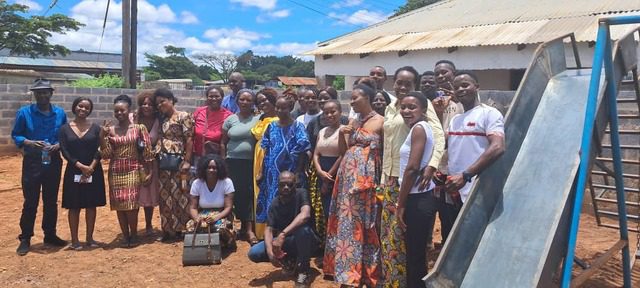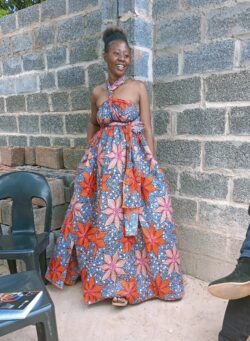

33 graduates of our vocational training project with Eliashib Restoration Organisation in Zambia are participating in our follow-on project, Transition to Work.
In a recent workshop, graduates from our 2010, 2016, 2018 and 2020 projects returned to share their stories with the current cohort of trainees.
In this article we meet former trainee, Karen Tembo, whose life was transformed through tailoring.

Eliashib Programme Manager, Evelyn Sichilima told us: “Our mentorship meeting was a “before meets after” kind of arrangement. We brought together Eliashib’s former tailoring trainees with the new ones who are Transitioning To Work. This was a great opportunity for knowledge exchange, mentorship and also help build a sense of community within the tailoring program.”
Graduates from projects as far back as 2010 recounted their experiences and shared tips and advice with the current trainees, fostering a supportive learning environment. Describing the challenges faced during their training, and their success stories afterwards, provided valuable insights for the new students and inspired them to work hard and stay committed to their training. The stories demonstrated that overcoming obstacles is part of the learning process and that persistence pays off in the end.
 One former trainee, who shared her story, is Karen Tembo. Karen sat her GCE exams in 2018, but financial difficulties prevented her from sitting retakes and she left education without the qualifications she desired. Without an income of her own, Karen began to feel she was a financial burden on her parents, as she had to ask then for money to meet basic needs such as bathing soap or lotion. For the next year, Karen began drawing fashion designs at home, and in 2020 she began her tailoring training with Eliashib.
One former trainee, who shared her story, is Karen Tembo. Karen sat her GCE exams in 2018, but financial difficulties prevented her from sitting retakes and she left education without the qualifications she desired. Without an income of her own, Karen began to feel she was a financial burden on her parents, as she had to ask then for money to meet basic needs such as bathing soap or lotion. For the next year, Karen began drawing fashion designs at home, and in 2020 she began her tailoring training with Eliashib.
The next few months were not always easy; Karen faced some challenges along the way. Evelyn explained: “Karen said that she didn’t know how to sew when she started the training and would on several occasions be told to undo her work and start all over again. This was so frustrating for her and she would sometimes cry because the training was so difficult for her but her trainer was always encouraging and willing to help her.”
Tools for Self Reliance Project & Safeguarding Officer, Lute Mbewe, told us that Karen also received a lot of criticism from community members and church relations. She said, “The critics believed tailoring was for older people and as a youngster, there is little that will be gained from learning the trade.” At her lowest point, Karen was even considering dropping out of the training, but with support and encouragement from her parents and the Eliashib team, she decided to continue with her training and she never looked back.
Through self-motivation and belief that hard effort is always rewarded, Karen completed her training and decided to rent a shop, starting a tailoring business with the refurbished sewing machine she received when she graduated. She began promoting her skills and products on WhatsApp and Facebook, and after just a month of trading, Karen saw her customer base start to increase.
Today, Karen continues to draw her own designs and make unique creations. Evelyn said: “When Karen attended the mentorship training meeting, we couldn’t help but notice the elegant dress she was wearing and we just couldn’t let the opportunity pass without getting more details about the design of the dress. She said she made the versatile dress that can be worn in multiple styles. According to Karen, 15 different styles can be worn, and we just had to see the different styles.”
Karen’s business is going from strength to strength. She makes men’s, women’s and children’s clothes to order, as well as tailoring outfits for traditional ‘Chilanga mulilo’ ceremonies (a pre-marriage ceremony in which the bride’s family prepare food and entertain the groom’s family). She is learning to sew wedding dresses, and in the future, Karen wants to travel to Nigeria to find new fashion ideas and inspiration for her work.
Karen’s story demonstrates what our trainees can achieve through dedicated training and support, hard work, self-belief and determination. Projects such as these would not be possible without you. If you would like to support our life-changing projects, please click here to give a one-off gift or set up a regular donation. Thank you.
April 2024